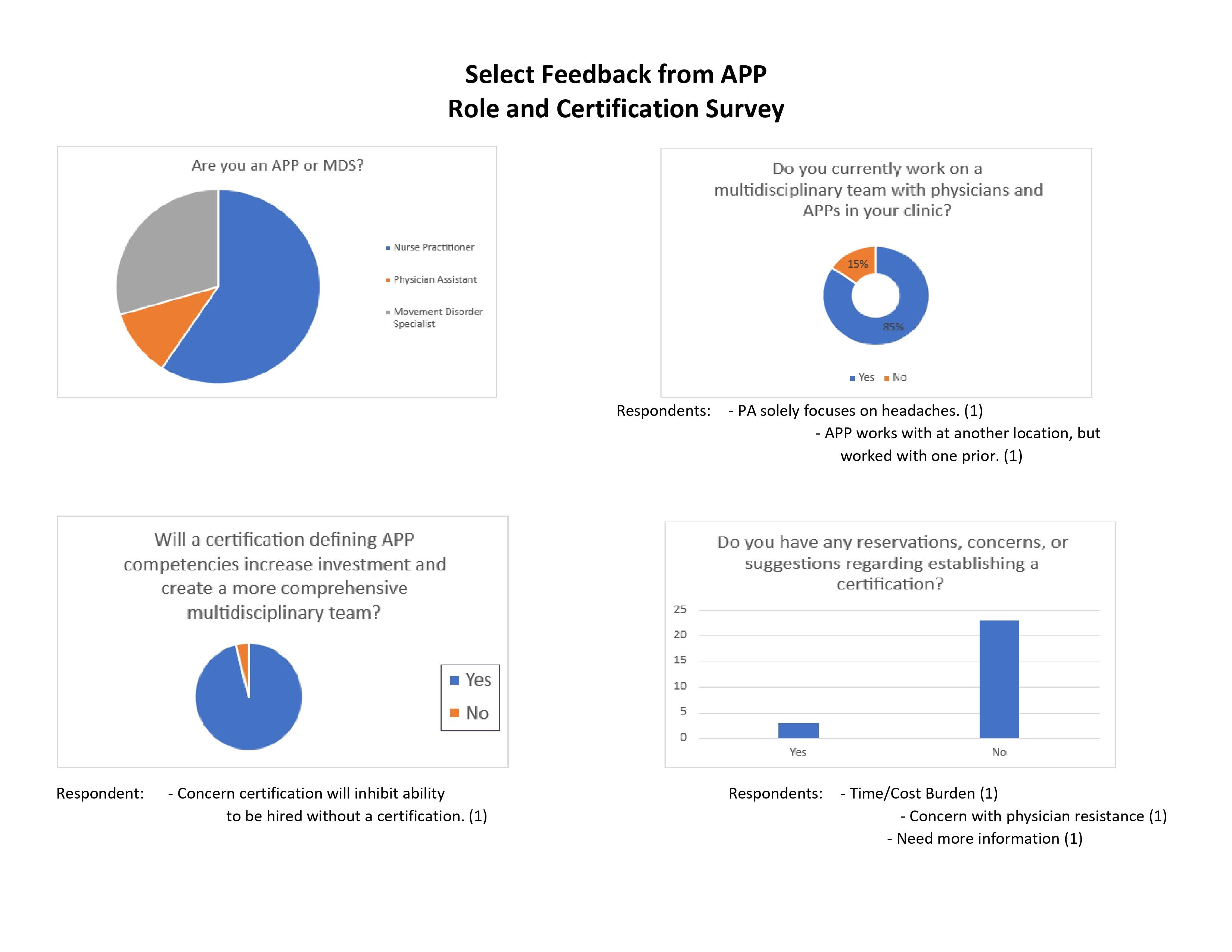Category: Allied Healthcare Professionals
Objective: Elevate awareness of impact of a professional certification for APPs in PD & movement disorders (PMD), which increases access specialized care, improving outcomes. Demonstrate certification is vital to improving overall PMD clinical practice.
Background: Limited access to specialty PMD providers results in disparate diagnosis & management (van Rumund, A., et al., 2018; Rizzo, G., et al, 2016). Annually, new US PD cases are ~90,000 (PF, 2022), greatly impacting care. PD is projected to increase >175% from 2015 to 2040 (Dorsey, et al., 2021), MDS fellowship vacancies are at 28%, 5-yr avg, (SFMatch, 2023) with unmet patient demand increases, and as people live longer, incidence of advanced PD will increase (GBD PD Collab, 2016). The AAN’s position states care team integration of APPs is crucial to improving access (AAN, 2020), a self-evident need. According to Uccelli, et al (2004), certification defines core competency, establishes a standard of care, & benefits the field. Other APP subspecialties’, such as MS certification, improved care mgmt & patient outcomes.
Method: Proposed subspecialty certification outcomes were assessed & evaluated, followed by distributing to APPs and MDS a 10-question Survey Monkey to gauge interest & support of an APP certification.
Results: 100% of respondents agreed APP certification will strengthen multidisciplinary teams & patient outcomes. Previous data demonstrates a positive relationship between nursing certification & clinical outcomes (Coelho, 2020), with enhanced skill sets & clinician confidence correlating with improved patient outcomes (Vaughn, 2020).
Conclusion: Certification for APPs demonstrating core competencies improves clinician skill set, knowledge of emerging therapies, and identification & earlier diagnosis, resulting in improved outcomes (Pagan, 2012). An APP-certified multidisciplinary team will have more depth, greater capacity, & better retention from diagnosis through management. Conversely, poor retention impacts team cohesion, negatively impacting patient outcomes. 100% of respondents agreed a certification for APPs strengthens a multidisciplinary team by improving retention rates & job satisfaction among the certified clinicians. Certification & professional advancement allows clinicians to invest in themselves, their practice, & specialty. Certification for APPs in PMD will enhance the field & community served.
References: American Academy of Neurology [AAN], 2020. Position Statement: Neurology Advanced Practice Providers.
American Academy of Nurse Practitioners [AANP], 2022. NP Fact Sheet (aanp.org)
American Academy of Physician Associates [AAPA], 2022. Learn more about the American Academy of PAs – AAPA
Coelho P. (2020). Relationship Between Nurse Certification and Clinical Patient Outcomes: A Systematic Literature Review. Journal of nursing care quality, 35(1), E1–E5. https://doi.org/10.1097/NCQ.0000000000000397
Dorsey, R., Sherer, T., Okun, M.S., Bloem, B.R., 2021. Ending Parkinson’s Disease: A Prescription for Action. 9781541724501. https://books.google.com/books?id=bGSdzQEACAAJ, PublicAffairs, 2021.
GBD 2016 Parkinson’s Disease Collaborators. Global, regional, and national burden of Parkinson’s disease, 1990-2016: a systematic analysis for the Global Burden of Disease Study 2016. Lancet Neurology. 17(11), 939-953. doi: 10.1016/S1474-4422(18)30295-3.
Pagan, F. (2012). Improving Outcomes Through Early Diagnosis in Parkinson’s Disease. Best Practices for Treating Parkinson’s Disease: A Focus on Symptoms and Considerations for Management. Vol 18; 7. Improving Outcomes Through Early Diagnosis of Parkinson’s Disease (ajmc.com)
Parkinson Foundation [PF], 2022 Statistics | Parkinson’s Foundation
Rizzo, G., Copetti, M., Arcuti, S., et al. (2016). Accuracy of clinical diagnosis of Parkinson disease; A systematic review and meta-analysis. Neurology. 86(6) 566-576; DOI: 10.1212/WNL.0000000000002350.
SF Match. (2023). Statistics – Movement disorder fellowship – SF Match – Residency and fellowship matching services. https://sfmatch.org/specialty/movement-disorders-fellowship/Statistics
Uccelli, M. M., Fraser, C., Battaglia, M. A., Maloni, H., & Wollin, J. (2004). Certification of multiple sclerosis nurses: an international perspective. International MS journal, 11(2), 44–51.
van Rumund, A., Aerts, M.B., Esselink, R.A.J. et al. Parkinson’s Disease Diagnostic Observations (PADDO): study rationale and design of a prospective cohort study for early differentiation of parkinsonism. BMC Neurol 18, 69 (2018). https://doi.org/10.1186/s12883-018-1072-x
Vaughn, Natalie., 2020. The Importance of Nurse Certifications. The Importance of Nurse Certifications | Relias
To cite this abstract in AMA style:
K. Papesh, B. Jones. Certification for advanced practice providers working in movement disorders expands access to quality expert and specialized care. [abstract]. Mov Disord. 2023; 38 (suppl 1). https://www.mdsabstracts.org/abstract/certification-for-advanced-practice-providers-working-in-movement-disorders-expands-access-to-quality-expert-and-specialized-care/. Accessed April 18, 2025.« Back to 2023 International Congress
MDS Abstracts - https://www.mdsabstracts.org/abstract/certification-for-advanced-practice-providers-working-in-movement-disorders-expands-access-to-quality-expert-and-specialized-care/

